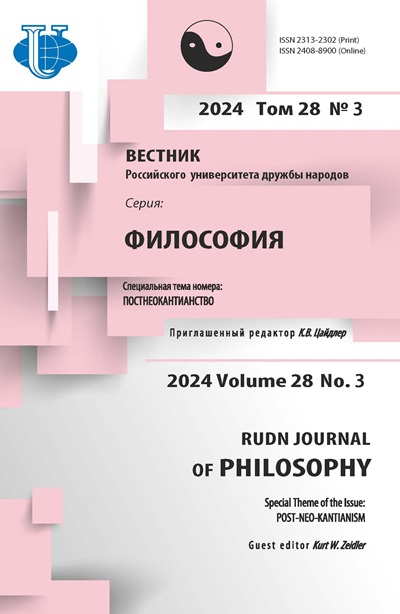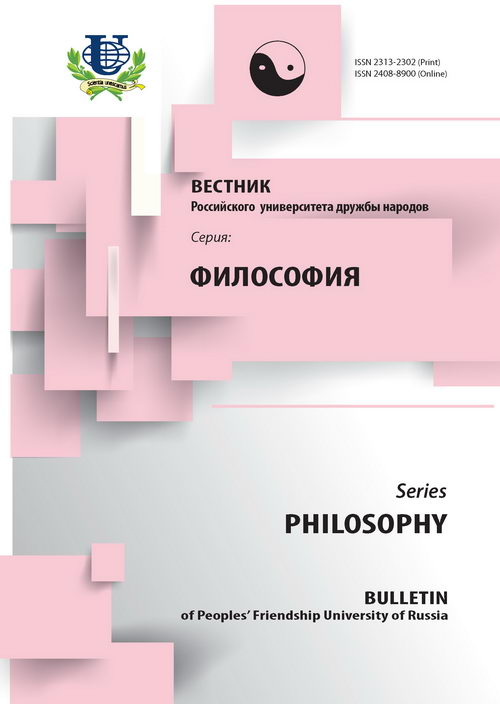История современной философии
- Авторы: Колесников А.С.1
-
Учреждения:
- Институт философии Санкт-Петербургский государственный университет
- Выпуск: № 3 (2015)
- Страницы: 77-93
- Раздел: Статьи
- URL: https://journals.rudn.ru/philosophy/article/view/11582
Цитировать
Полный текст
Аннотация
В статье раскрываются итоги развития философии в ХХ в. и положение современной философии после постмодерна. Отмечается, что в наши дни идут активные дискуссии по различным «пост» вообще: постструктурализм, постмодернизм, постмодернистское богословие, постмарксизм, постэссенциализм и т.п. Все эти «пост» термины функционируют как последовательные маркеры, обозначая то, что следует после модерна. Постмодернист призывает к новым категориям, способам мысли и письма, ценностей и политики, чтобы преодолеть дефициты модерновых дискурсов и методов. Показано влияние постмодерна на сферы бизнес управления и образования. Указаны концептуальные пороки постмодернистских построений. Раскрыты изменения задач философии, ее значения и статуса к началу XXI в.
Об авторах
Анатолий Сергеевич Колесников
Институт философии Санкт-Петербургский государственный университет
Email: kolesnikov1940@yandex.ru
Кафедра истории философии
Список литературы
- Доманска Эва. Философия истории после постмодернизма. М.: «Канон+» РООИ «Реабилитация», 2010.
- Ильин И.П. Постструктурализм. Деконструктивизм. Постмодернизм. М.: Интрада, 1996.
- Колесников А.С., Ставцев С.А. Формы субъективности в философской культуре ХХ века. СПб.: Санкт-Петерб. филос. общество, 2000.
- After Philosophy: End оr Transformation? Ed. by Kenneth Baynes, James Bohman, and Thomas McCarthy. Cambridge, Mass., London: MIT Press, 1987.
- Becker T. Why pragmatism is not practical.// Journal of Management Inquiry. 2004. Vol. 13. P. 224-228.
- Belsey C. Critical practice. L.; N.Y: Methuen, 1980.
- Bennington G. Interrupting Derrida. New York: Routledge, 2000.
- Blake N., Smeyers P., Smith R., Standish P. Thinking Again: Education After Postmodernism. Westport, CN: Bergin and Garvey, 1998.
- Calas M.B., Smircich L. Past postmodernism? Reflections and tentative directions // Academy of Management Review. 1999. Vol. 24. P. 649-671.
- Derrida J. Hospitality, justice and responsibility: A dialogue with Jacques Derrida. In R. Kearney & S. Critchley ([Eds.), Questioning ethics: Contemporary debates in philosophy. London: Routledge, 1999. P. 65-83.
- Derrida J. The future of the profession or the university without condition. In Jacques Derrida and the humanities. Cambridge, UK: Cambridge University Press, 2001. P. 24-57.
- Derrida J. Negotiations: Interventions and Interviews, 1971-2001. Ed. Elizabeth G. Rottenberg. Stanford: Stanford University Press, 2002.
- Easthope A. British post-structuralism since 1968. L.; N.Y., 1988. P. 187-188.
- Edwards R. All quiet on the postmodern front? // Stud. Philos. Educ. 2006. Vol. 25. P. 273-278.
- Edwards R., Usher R. Lifelong learning: A postmodern condition of education? // Adult Education Quarterly. August 2001. Vol. 51. No. 4. P. 273-287.
- Ferry Luc and Rothnie Steven. The Three Phases of Modern Philosophy: Tasks for a Secularized Thought // Thesis Eleven. 1994. Vol. 37. P. 1-9.
- Freeman R.E. Divergent stakeholder theory // Academy of Management Review. 1999. Vol. 24. P. 233-236.
- Habermas J. Nachmetaphysisches Denken. Frankfurt-am-Main: Suhrkamp-Verlag, 1992. S. 57-58.
- Kazmi Yedullah. Encounter with the other/difference panoptican: a world order through education or education's // Philosophy Social Criticism. 1993. Vol. 19. P. 195-212.
- Kearney Richard. Terror, philosophy and the sublime: Some philosophical reflections on 11 September // Philosophy Social Criticism. 2003. Vol. 29. No 1. P. 23-51.
- Keohane Kieran. Central problems in the philosophy of the social sciences after postmodernism: reconciling consensus and hegemonic theories of epistemology and political ethics // Philosophy Social Criticism. 1993. Vol. 19. P. 145-169.
- Kilduff M. Deconstructing organizations // Academy of Management Review. 1993. Vol. 18. P. 13-31.
- Kilduff M., Mehra A. Postmodernism and organizational research // Academy of Management Review. 1997. Vol. 22. P. 453-481.
- Leaman Oliver. World Philosophies: Review Article // The Expository Times. 1999. Vol. 110. P. 360-372.
- Linstead S. [Ed.]. Organization theory and postmodern thought. London: Sage, 2003.
- Martin J. Deconstructing organizational taboos: The suppression of gender conflict in organizations // Organization Science. 1990. Vol. 1. P. 339-359.
- McLaren P. Revolutionary multiculturalism: Pedagogies of dissent for the new millennium. Boulder, Colo: Westview Press. 1997.
- Mumby D.K., Putnam L.L. The politics of emotion: A feminist reading of bounded rationality // Academy of Management Review. 1992. Vol. 17. P. 465-486.
- Nash Kate. Thinking political sociology: beyond the limits of post-Marxism // History of the Human Sciences. 2010. Vol. 15. No. 4. P. 97-114.
- Nelson J.S. Account and acknowledge, or represent and control? Postmodern politics and economics of collective responsibility // Accounting, Organizations and Society. 1993. Vol. 18. P. 207-229.
- Rosen Stanley. The Identity of, and the Difference between, Analytical and Continental Philosophy // International Journal of Philosophical Studies. 2001. Vol. 9. No. 3. P. 341-348.
- Verharen Charles C. Black to the Future: A Philosophy for a Global Village // Journal of Black Studies. 2002. Vol. 33. P. 199-217.
- Waks Leonard J. Globalization, state transformation, and educational re-structuring: why postmodern diversity will prevail over standardization // Stud. Philos. Educ. 2006. Vol. 25. P. 403-424.
- Weitzner David. Deconstruction Revisited: Implications of Theory Over Methodology // Journal of Management Inquiry. 2007. Vol. 16. No. 1. March. P. 43-54.
















